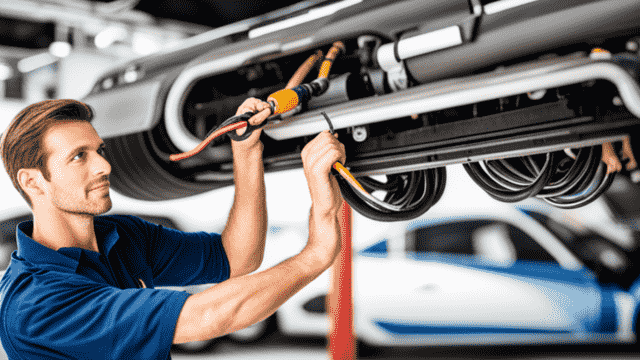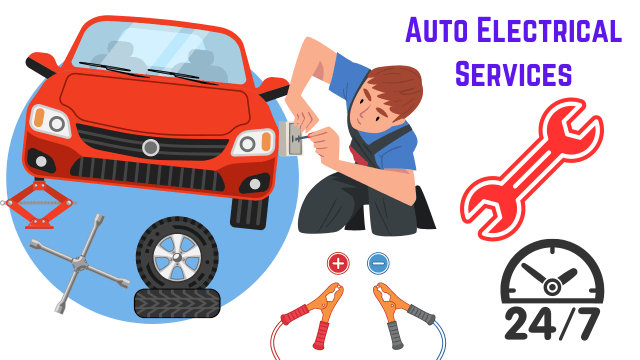Are you a car owner who has experienced issues with your vehicle’s electrical system? Auto electrical problems can be frustrating and inconvenient, but understanding the basics of auto electrical services can help you navigate these challenges more effectively. In this article, we will delve into the secrets of auto electrical services, providing you with the knowledge you need to ensure your vehicle’s electrical system is in top-notch condition.
Table of Contents
- Introduction
- The Importance of Auto Electrical Services
- Common Auto Electrical Problems
-
- Battery Issues
- Alternator Malfunction
- Starter Motor Problems
- Faulty Wiring
4.Diagnostic Tools and Techniques
-
- OBD-II Scanners
- Multimeters
- Wiring Diagrams
- Voltage Drop Testing
5.Professional Auto Electrical Services
-
- Choosing a Reliable Auto Electrician
- Services Offered by Auto Electricians
6.Preventive Maintenance Tips
-
- Regular Battery Inspections and Replacements
- Checking and Cleaning Electrical Connections
- Keeping an Eye on Warning Signs
7.DIY Tips for Minor Electrical Issues
-
- Replacing Fuses
- Checking and Replacing Bulbs
- Cleaning Corroded Battery Terminals
8.The Future of Auto Electrical Systems
-
- Advancements in Electric Vehicles
- Integration of Smart Technologies
9.Conclusion
10.FAQs
Introduction
Modern vehicles heavily rely on electrical systems to function properly. From starting the engine to operating various components such as lights, air conditioning, and entertainment systems, the electrical system is crucial in providing a comfortable and convenient driving experience. However, electrical issues can arise due to various factors, causing disruptions in your daily commute.
The Importance of Auto Electrical Services
Auto electrical services are essential for maintaining and repairing the electrical components of your vehicle. These services encompass a wide range of tasks, including diagnosing electrical problems, fixing faulty wiring, replacing worn-out parts, and ensuring the overall efficiency of the electrical system.
Regularly availing yourself of auto electrical services can prevent potential breakdowns, improve your vehicle’s performance, and extend its lifespan. Moreover, timely repairs can save you from costly repairs in the future and ensure your safety on the road.
Best GPS Fleet Managment System 2023 : See NOW
Common Auto Electrical Problems
Understanding common auto electrical problems can help you identify issues promptly and seek professional assistance. Here are some of the most prevalent electrical problems encountered by car owners:
Battery Issues
One of the primary causes of a vehicle not starting is a dead or weak battery. Over time, batteries lose their charge or become damaged, leading to unreliable performance. Auto electrical services can diagnose battery issues and provide solutions such as recharging, battery replacements, or repairs.
Alternator Malfunction
The alternator generates electricity while the engine runs and replenishes the battery’s charge. If the alternator malfunctions, the battery may not receive sufficient power, resulting in various electrical problems. Auto electricians can diagnose and repair alternator issues effectively.
Starter Motor Problems
The starter motor initiates the engine’s combustion process. Faulty starter motors can cause difficulty starting the vehicle or result in no response when you turn the ignition key. Auto electrical services can diagnose and repair starter motor problems to ensure smooth engine startup.
Faulty Wiring
Damaged or faulty wiring can cause various electrical issues in a vehicle. Shorts, open circuits, and loose connections can lead to malfunctions in different electrical components. Auto electrical services employ skilled technicians who can identify and repair faulty wiring, ensuring the proper functioning of your vehicle’s electrical system.
Diagnostic Tools and Techniques
Auto electricians utilize various diagnostic tools and techniques to identify and resolve electrical issues. Here are some commonly used tools and techniques:
OBD-II Scanners
On-Board Diagnostic (OBD-II) scanners retrieve diagnostic trouble codes (DTCs) from your vehicle’s computer system. These codes provide valuable information about specific issues, allowing auto electricians to pinpoint the problem accurately.
Multimeters
Multimeters are versatile tools for measuring electrical circuit voltage, current, and resistance. Using multimeters, auto electricians can assess the health of electrical components and determine if they are functioning within the expected parameters.
Wiring Diagrams
Wiring diagrams are visual representations of the electrical system in your vehicle. They illustrate the connections between different components, aiding auto electricians in effectively diagnosing and fixing wiring issues.
Voltage Drop Testing
Voltage drop testing is performed to identify voltage losses in electrical circuits. By measuring the voltage difference across various points in a course, auto electricians can identify areas of high resistance or poor connections that may be causing electrical problems.
Professional Auto Electrical Services
Choosing a reliable and experienced auto electrician is essential when it comes to auto electrical services. Here are some considerations to keep in mind:
Choosing a Reliable Auto Electrician
Look for an auto electrician with a proven track record of providing high-quality services. Check for certifications, licenses, and customer reviews to ensure that you’re entrusting your vehicle to a competent professional.
Services Offered by Auto Electricians
Auto electricians offer various services, including electrical system diagnostics, repairs, component replacements, and installations. They can address issues with batteries, alternators, starters, ignition systems, lighting, and more. Whether it’s a minor electrical glitch or a complex problem, a professional auto electrician has the expertise to handle it.
Preventive Maintenance Tips
Regular maintenance is key to preventing auto electrical problems. Here are some preventive maintenance tips to keep your vehicle’s electrical system in optimal condition:
Regular Battery Inspections and Replacements
Inspect your vehicle’s battery regularly for corrosion, leakage, or damage. Clean the battery terminals and connections to ensure a good electrical connection. If your battery is old or weak, consider replacing it before it fails.
Checking and Cleaning Electrical Connections
Inspect the electrical connections in your vehicle, including cables, plugs, and sockets. Ensure that they are secure and free from dirt or corrosion. Clean any dirty links and tighten loose ones to maintain reliable electrical connections.
Keeping an Eye on Warning Signs
Attention to warning signs that indicate potential electrical problems, such as dimming headlights, flickering dashboard lights, malfunctioning power windows, or a weak starter. Promptly address these issues to prevent further damage and breakdowns.
DIY Tips for Minor Electrical Issues
While complex electrical repairs are best left to professionals, there are some minor issues you can tackle on your own. Here are a few DIY tips:
Replacing Fuses
If a specific electrical component stops working, it may be due to a blown fuse. Consult your vehicle’s manual to locate the fuse box and identify the corresponding fuse. Replace the blown fuse with a new one of the same rating.
Checking and Replacing Bulbs
If a headlight, taillight, or interior light malfunctions, the bulb must be replaced. Refer to your vehicle’s manual for instructions on accessing and replacing bulbs. Ensure that you use the correct type and wattage of bulbs for your specific vehicle.
Cleaning Corroded Battery Terminals
Corroded battery terminals can hinder the flow of electricity and cause starting issues. To clean them, disconnect the battery cables and use baking soda and water to scrub the corrosion. Rinse with clean water and reconnect the wires, ensuring a secure connection.

The Future of Auto Electrical Systems
As technology advances, auto-electrical systems are continuously evolving. Here are a couple of trends shaping the future of auto electrical systems:
Advancements in Electric Vehicles
Electric vehicles (EVs) are gaining popularity due to their eco-friendly nature and advancements in battery technology. The future will see further improvements in EV range, charging infrastructure, and overall efficiency, making them a viable alternative to traditional combustion engine vehicles.
Integration of Smart Technologies
Modern vehicles are becoming more interconnected and equipped with advanced smart technologies. These features rely on complex electrical systems, from infotainment systems to advanced driver-assistance systems (ADAS). Integrating artificial intelligence, voice recognition, and connectivity will continue to enhance the driving experience.
Conclusion
Understanding the secrets of auto electrical services is essential for every car owner. You can guarantee the durability and dependability of your vehicle’s electrical system by recognizing common problems, utilizing diagnostic tools, seeking professional help when needed, and performing preventive maintenance. Remember, safety should always be a priority, so consult an experienced auto electrician for complex issues or if you’re unsure about handling electrical repairs yourself.
FAQs (Frequently Asked Questions)
Q: How often should I have my vehicle’s electrical system checked?
A: It’s recommended to have your vehicle’s electrical system inspected at least once a year or if you experience any electrical issues.
Q: Can I jump-start my vehicle if the battery is dead?
A: You can jump-start your vehicle using jumper cables and another vehicle with a healthy battery. However, addressing the underlying issue causing the battery to die is important.
Q: What should I do if my car’s alternator fails?
A: If your car’s alternator fails, it’s crucial to stop driving and seek professional assistance. Continued driving without a functioning alternator can lead to a complete loss of electrical power.
Q: Are auto electrical repairs expensive?
A: The cost of auto electrical repairs can vary depending on the issue and the vehicle’s make and model. It’s best to consult a professional auto electrician for an accurate estimate.
Q: Can I install aftermarket electrical components in my vehicle?
A: Yes, you can install aftermarket electrical components. However, choosing reputable brands and ensuring compatibility with your vehicle’s electrical system is important.
GPS location tracker: See NOW

